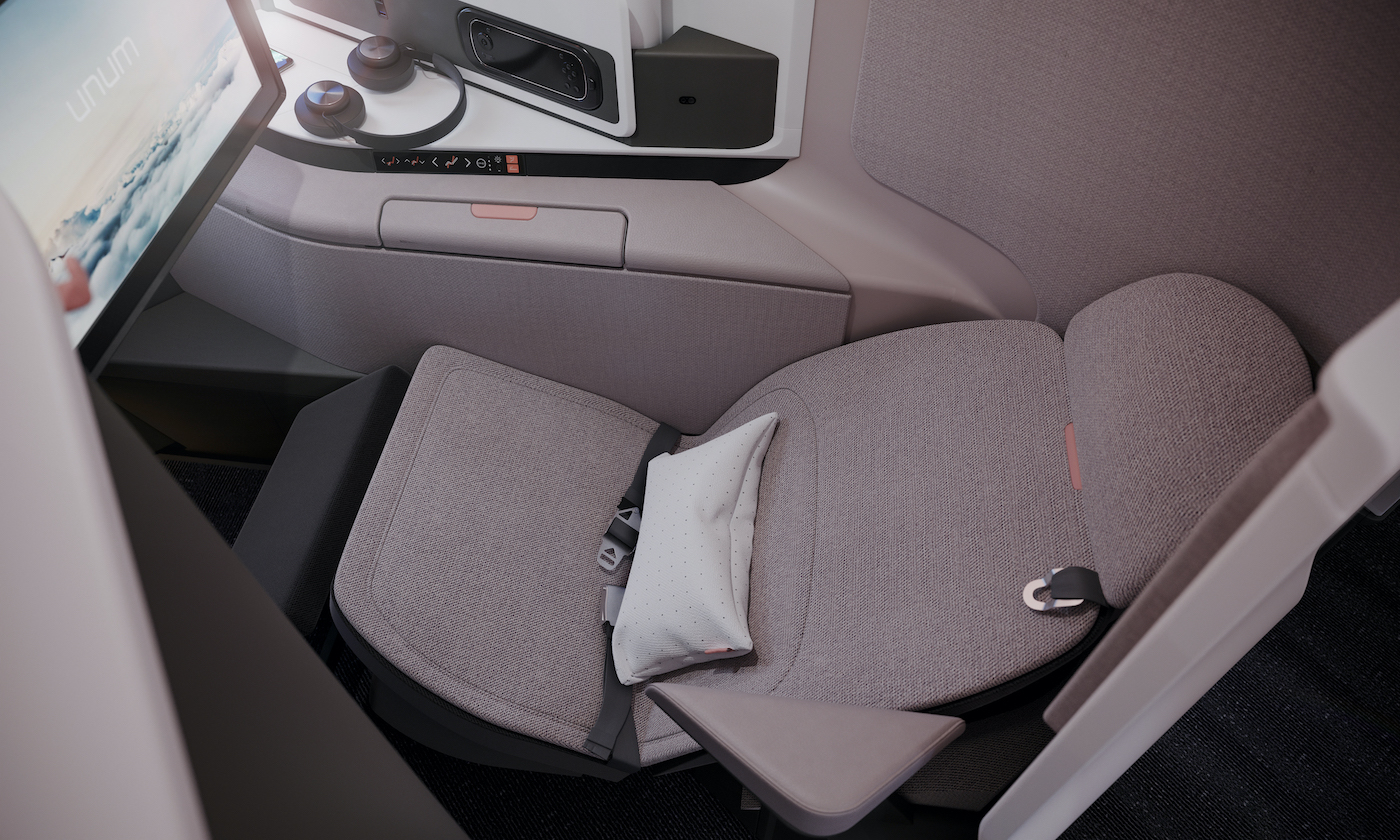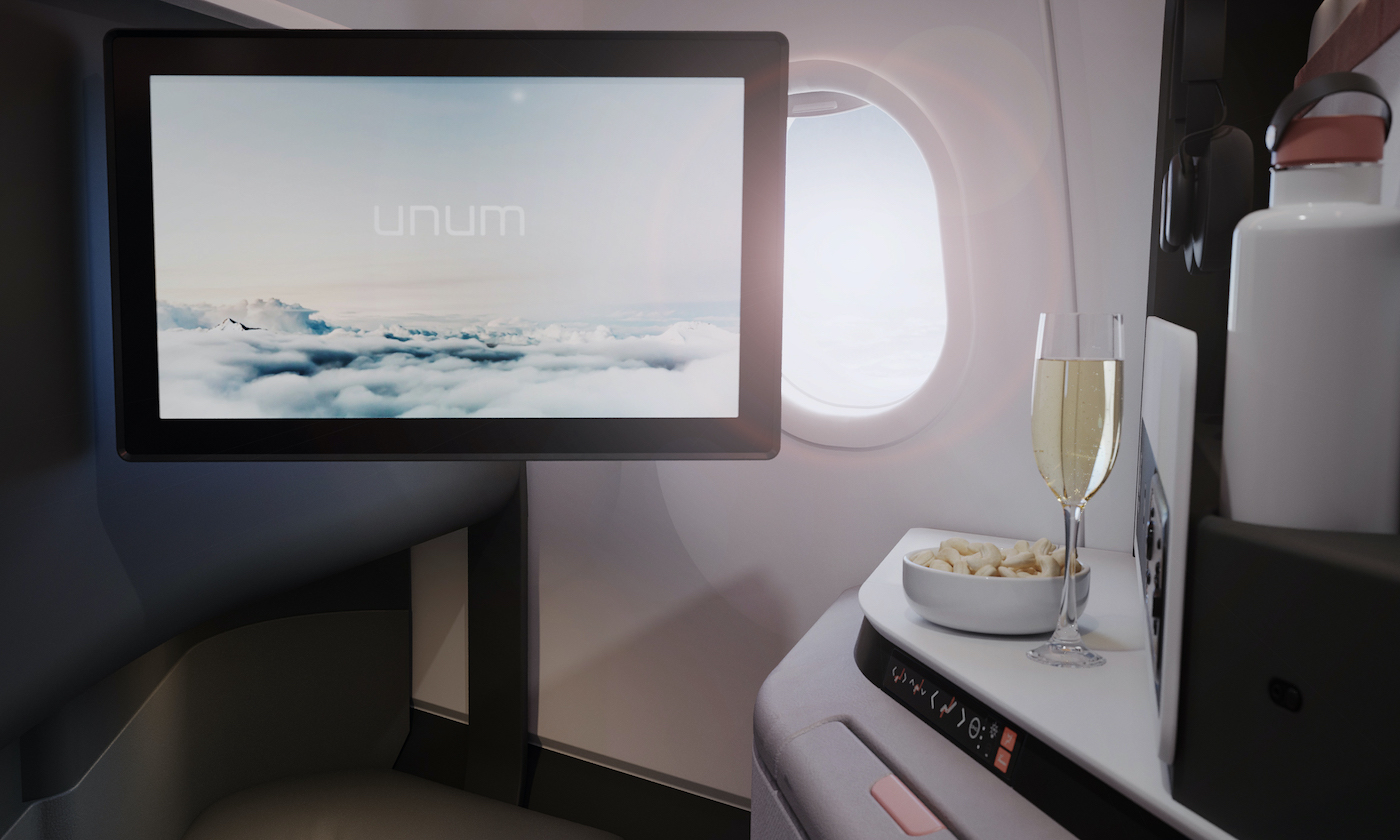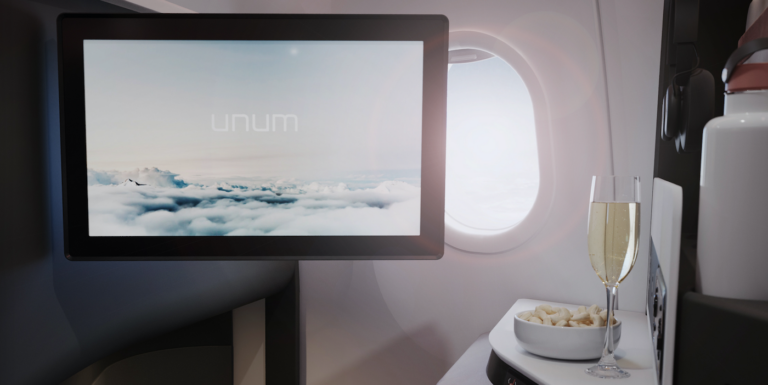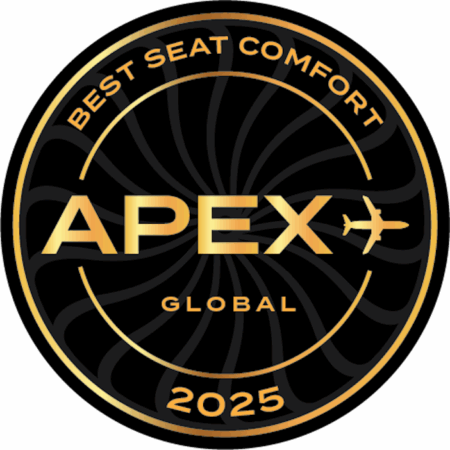Every challenging period for aviation is typically followed by a boom in travel demand which, in turn, boosts the aircraft interiors sector. Thus while the announcement that a new business class seating supplier is launching today may be regarded as a brave move by many, others could say it is launching at the beginning of another upward trajectory for the sector. The company, Unum Aircraft Seating, is being touted as not just another seating supplier, but one with core goals of reliable delivery and meeting the needs of smaller carriers.
The founder and chairman, Chris Brady, may well be familiar to you from his roles at British Airways and Virgin Atlantic, and more recently as the CEO of Acro Aircraft Seating. He led Acro from its 2003 launch, built it into a successful economy seating provider and approved supplier to Airbus, and oversaw its acquisition by China’s ZTC for £55 million in 2017. It should come as no surprise that when Brady left Acro in January 2019, while he enjoyed a little leisure time during his nine-month non-compete period, he soon found himself missing the thrust of the aircraft interiors sector. An idea formed…
In Brady’s latter months at Acro he had considered setting up a business class seating division – Acro Business Class – separate from the economy class operations as the volumes, pricing, production and design of premium seating have very different requirements. That notion of a new type of business class seating company stayed with him. Brady considers the economy class sector to be well served today, by suppliers both huge and small, but with fewer players in the business class seating market, especially following some market consolidation, and having gained a deeper understanding of the market, he felt there was space for a new player.
In early 2020, with investments agreed, the pieces were falling into place to set up a new company. Covid-19 then hit the world, with huge effects for the aviation sector, but Brady and his team decided to go ahead and finalise creating Unum. Their industry experience told them it was still a good move, especially as airlines need successful business class operations to rebuild their finances post-pandemic.
“Historically, the aircraft interiors industry has seen a bit of a boom after major shocks,” explains Brady. “If you look back at the Gulf War, that was followed by a big boom in travel, and the same happened after 9/11 and the financial crisis. When there’s turbulence in the airline industry, that means LOPAs change, and when LOPAs are changing then money is flowing into the aircraft interiors industry. It’s bad for airlines, but there are opportunities.”

The aim of Unum Aircraft Seating is not to disrupt the market with a new type of in-seat experience or an innovative LOPA – indeed the initial seat designs are deliberately conservative – but rather to meet the fundamental need for seating that is delivered on time, every time, to the required quality standards.
It will take some time for Unum to prove itself and be considered for the airframer catalogues, so the company is initially targeting the retrofit market. Brady is putting employee and customer satisfaction before profit, and wants that satisfaction to extend to the smaller airlines and startup carriers (of which around 100 are currently hoping to take to the skies). Such airlines, which can struggle to place orders for seating due to their small order requirements, are often pushed towards the second-hand seating market, immediately putting them at a competitive disadvantage compared to the larger carriers in terms of inflight experience, weight, maintenance and reliability. Unum aims to look after these airlines – the ones that perhaps need the most support from their seating supplier. And while each order may be relatively small, the potential customer base is broad.
“There’s definitely a niche for a new entrant into the marketplace,” says Brady, who is not aiming for a huge market share, but rather for a self-sustaining business producing about 100 seats per month, with around £60-70 million turnover – and 200 staff driven by great morale.
There may be a market, but how does Unum intend to be such a reliable partner? The company has not established a factory yet – that is likely to happen in 2023 or 2024, based in Southeast England. The team has been establishing its core processes to ensure on-time deliveries though, including determining which elements of the seat manufacturing process to conduct in-house, and which to subcontract. Production of the elements which carry the greatest risk of problems occurring or delivery issues arising will be brought in-house so Unum can apply the resources needed to overcome those issues swiftly and keep the programme on track for the delivery deadline. Prioritising a UK-based supply chain and applying a small degree of additive manufacturing will also help minimise risk.

The shape of things to come
While business class seats for long-haul narrowbodies have been a trending topic over the past couple of years, aircraft such as the A321LR are new, and the vast majority of their seating is thus line-fit models – not the territory for a startup. Thus the long-haul widebody retrofit market was identified as the key market, especially for those smaller carriers that are struggling to replace their step-over seats with more comfortable and cabin-dense seating. The A330 was also identified as an important aircraft in the fleets of potential customers, and while many business class seats are optimised for the B777, B787 or A350, Unum feels they do not suit the A330 cabin so well. This drove some design considerations.
The team also looked at the market and saw that around two-thirds of modern widebody business class seats flying today are outward-facing herringbones – which made a fundamental design decision rather easy. “Because we weren’t trying to launch a revolutionary new seat, but trying to launch a revolutionary new business, we chose a class of seat that was mainstream,” explains Brady.
Indeed the outward-facing herringbone layout is a safe bet, delivering a good balance between passenger experience and seating density, combined with a spacious bed surface. The Unum team benchmarked the best-selling models on the market and set out to match their key comfort and density factors. The aim wasn’t to create a market-disrupting seat with a clever LOPA, as that would be more challenging for airlines to implement and greatly increase the potential risks, from passenger reception, to certification, to delivery delays.
Thus when Unum approached Acumen Design Associates to create a seat – a studio which has devised some innovative designs such as Etihad’s B787 first class and United’s Polaris – the passenger experience was made deliberately familiar. Acumen set to work on a lie-flat design that would work well on all widebodies, including the A330, and the result is the Unum One seat and the high-density Unum OneHD model. The seat has been designed with simplicity in mind, to minimise production risks, and with a modular design that helps simplify airlines’ maintenance requirements.
Unum does claim some advantages of Unum One against its rivals though, with the 21in-wide seat offering biggest bed and largest side furniture of any herringbone seat on the market, while matching the density of any alternative. Unum OneHD is 19in-wide, enabling another seating row to be added from a 34in pitch, while maintaining an 80in-long bed.

One seat for all
During the design development stages, “fantastically and, and completely accidentally” as Brady says, it turned out that a seat that would be suitable for an A330 could also fit on a long-range narrowbody. Such a universal seat certainly lives up to the company’s name, with unum meaning ‘one’ in Latin.
“Despite our best intentions and not setting out to create something extraordinary, we’ve got a seat that offers a consistent passenger experience across all aircraft types,” Brady adds. There are some slight differences between the widebody and narrowbody designs (mainly due to egress requirements), but nothing that an average passenger would notice. Customers can even specify a door, an option that Brady expects the majority of clients to take up.
The Unum seats are suitable for the narrowbody A321 and B737, as well as the A330, A350, B777 and B787.
Aircraft Interiors International will delve deeper into the design of Unum One and Unum OneHD soon, and try out a prototype of the seat. Watch this space…





